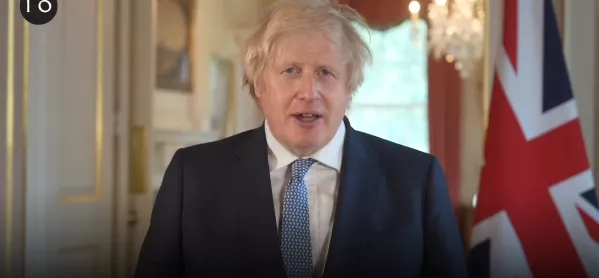Boris Johnson has announced tonight that schools and colleges across England will close under a national lockdown.
The prime minister said: “Because we have to now do everything we possibly can to stop the spread of the disease, primary schools, secondary schools and colleges across England must move to a remote provision from tomorrow except for vulnerable children and the children of key workers...
“We recognise that this means it’s not possible or fair for all exams to go ahead this summer as normal.
“The education secretary will work with Ofqual to put in place alternative arrangements. We will provide extra support to ensure pupils entitled to free school meals will continue to receive them while schools are closed and we will distribute more devices to support remote education.”
News: National teacher walkout over Covid safety expected
Exclusive: Heads’ Covid school safety legal challenge
Read: London U-turn not about school safety concerns, says DfE
New government guidance makes it clear that schools will be shut for most pupils at least until the February half-term. However, the prime minister said that early years settings, including nurseries, would remain open and available to parents.
Coronavirus: School closures ‘cause distress’
Mr Johnson added: “I completely understand the inconvenience and distress this late change will cause millions of parents and pupils up and down the country; parents whose children were in school today may reasonably ask why we did not take this decision sooner.
“The answer is simply that we have been doing everything in our power to keep schools open because we know how important each day in education is to children’s life chances.
“And I want to stress that the problem is not that schools are unsafe for children - children are still very unlikely to be severely affected by even the new variant of Covid. The problem is that schools may nonetheless act as vectors for transmission, causing the virus to spread between households.”
Geoff Barton, the Association of School and College Leaders’ general secretary, said: “We are relieved the government has finally bowed to the inevitable and agreed to move schools and colleges to remote education in response to alarming Covid infection rates.
“It is very frustrating that it issued legal threats to schools at the end of last term to prevent them moving to remote education, and then made a series of chaotic announcements about the start of this term.”
Mary Bousted, joint general secretary of the NEU teaching union, said: “This is a crisis point for the nation, and a great deal of what got us here should not simply be blamed on new strains of the virus.
“The government has had eight months to prepare for a renewed period of remote learning, and for alternatives to exam assessment at GCSE and A level, but it has not used that time wisely or well.
”[Education secretary] Gavin Williamson has become an expert in putting his head in the sand - ignoring the mounting evidence of Covid-19 transmission in schools to education professionals and into pupils’ households.”
The news comes after it was announced today that schools in Scotland will now not reopen fully for the face-to-face teaching of all pupils until Monday 1 February at the earliest.
This afternoon, Labour leader Sir Keir Starmer said the government must order schools in England to close as part of a new national lockdown.
He said it was “tragically inevitable” that pupils would have to learn from home in order for the country to regain control over the coronavirus, protect the struggling health service and create the breathing space to deploy millions of vaccines.
